|
Books Should Be Free Loyal Books Free Public Domain Audiobooks & eBook Downloads |
|
|
Books Should Be Free Loyal Books Free Public Domain Audiobooks & eBook Downloads |
|
Non-fiction |
|---|
|
Book type:
Sort by:
View by:
|
By: Gaius Suetonius Tranquillus (c75 - c160 AD) | |
|---|---|
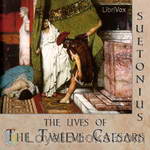 The Lives of the Twelve Caesars
The Lives of the Twelve Caesars
The Twelve Caesars is a set of twelve biographies of Julius Caesar and the first 11 emperors of the Roman Empire. The work was written in 121 during the reign of the emperor Hadrian, while Suetonius was Hadrian’s personal secretary. On the Life of the Caesars concentrates on the acts and personalities of the Julio-Claudians and their immediate successors. Together with Tacitus’ Annals, this work is a major source for the historical details in Robert Graves’ novels “I Claudius” and “Claudius the God”. | |
By: Garrett P. Serviss (1851-1929) | |
|---|---|
 Curiosities of the Sky
Curiosities of the Sky
Is there intelligent life on Mars? Why are there starless gaps in the Milky Way? What creates the Aurora Borealis or the Northern Lights? These and more are the interesting questions that are asked and sought to be answered in the 1909 book, Curiosities of the Sky by Garrett P. Serviss. Garrett Putnam Serviss was an American astronomer and popular sci-fi writer. He believed that science should be understood and enjoyed by everyone, not just by scientists. Though he was trained as a lawyer, he went to work as a newspaper reporter with The New York Sun in 1867... | |
By: Gary N. (Gary Nathan) Calkins (1869-1943) | |
|---|---|
 Marine Protozoa from Woods Hole Bulletin of the United States Fish Commission 21:415-468, 1901
Marine Protozoa from Woods Hole Bulletin of the United States Fish Commission 21:415-468, 1901
| |
By: Gaston Maspero (1846-1916) | |
|---|---|
 History Of Egypt, Chaldea, Syria, Babylonia, and Assyria
History Of Egypt, Chaldea, Syria, Babylonia, and Assyria
History Of Egypt, Chaldæa, Syria, Babylonia, and Assyria is the masterwork of one of the fathers of modern egyptology. This work, in twelve volumes, was translated from the French original, “Histoire ancienne des peuples de l’Orient classique” and published in 1903-1904. Maspero was a largely self-taught master of hieroglyphic translation. In November 1880, he was placed at the head of a French archeological mission, which developed later into the Institut Français d’Archéologie Orientale... | |
 Manual of Egyptian Archaeology and Guide to the Study of Antiquities in Egypt
Manual of Egyptian Archaeology and Guide to the Study of Antiquities in Egypt
A handbook of Egyptian archaeology, issued by the British Museum, considered suitable for British tourists travelling to Egypt in the 19th Century. (Introduction by Timothy Ferguson) | |
By: Gene Stratton-Porter (1863-1924) | |
|---|---|
 Moths of the Limberlost
Moths of the Limberlost
Gene Stratton-Porter was an American author, amateur naturalist, wildlife photographer, specializing in the birds and moths in one of the last of the vanishing wetlands of the lower Great Lakes Basin. The Limberlost and Wildflower Woods of northeastern Indiana were the laboratory and inspiration for her stories, novels, essays, photography, and movies. She was an accomplished author, artist and photographer and is generally considered to be one of the first female authors to promulgate public positions; conserving the Limberlost Swamp in her case... | |
By: General Sir John Miller Adye (1819-1900) | |
|---|---|
 Indian Frontier Policy, an Historical Sketch
Indian Frontier Policy, an Historical Sketch
“The subject of our policy on the North-West frontier of India is one of great importance, as affecting the general welfare of our Eastern Empire, and is specially interesting at the present time, when military operations on a considerable scale are being conducted against a combination of the independent tribes along the frontier. It must be understood that the present condition of affairs is no mere sudden outbreak on the part of our turbulent neighbours. Its causes lie far deeper, and are the consequences of events in bygone years”. (From the author’s Preface, 1897). | |
By: Geoffrey H. Malins (1887-1943) | |
|---|---|
 How I Filmed the War
How I Filmed the War
An account of World War I and the experience of filming it by an early cinematographer (and, after the war, successful director) who was there. | |
By: George A. (George Alexander) Morton (1857-) | |
|---|---|
 Law and Laughter
Law and Laughter
| |
By: George Berkeley (1685-1753) | |
|---|---|
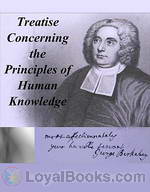 A Treatise Concerning the Principles of Human Knowledge
A Treatise Concerning the Principles of Human Knowledge
A Treatise Concerning the Principles of Human Knowledge, Part 1 (Commonly called “Treatise” when referring to Berkeley’s works) is a 1710 work by the Irish Empiricist philosopher George Berkeley. It largely seeks to refute the claims made by his contemporary John Locke about the nature of human perception. Both Locke and Berkeley agreed that there was an outside world, and it was this world which caused the ideas one has within one’s mind. Berkeley sought to prove that the outside world was also composed solely of ideas, suggesting that “Ideas can only resemble Ideas”... | |
 Three Dialogues Between Hylas and Philonous
Three Dialogues Between Hylas and Philonous
Berkeley uses Hylas as his primary contemporary philosophical adversary, John Locke. A Hylas is featured in Greek mythology and the name Hylas is derived from an ancient Greek word for “matter” which Hylas argues for in the dialogues. Philonous translates as “lover of mind.” In The First Dialogue, Hylas expresses his disdain for skepticism, adding that he has heard Philonous to have “maintained the most extravagant opinion… namely, that there is no such thing as material substance in the world.” Philonous argues that it is actually Hylas who is the skeptic and that he can prove it. Thus, a philosophical battle of wit begins. | |
By: George Bernard Shaw (1856-1950) | |
|---|---|
 The Perfect Wagnerite
The Perfect Wagnerite
The Perfect Wagnerite: A Commentary on the Niblung's Ring (originally published London, 1898) is a philosophical commentary on Richard Wagner's Der Ring des Nibelungen, by the Irish writer George Bernard Shaw. Shaw offered it to those enthusiastic admirers of Wagner who "were unable to follow his ideas, and do not in the least understand the dilemma of Wotan." He interprets the Ring in Marxian terms as an allegory of the collapse of capitalism from its internal contradictions. Musicologically, his... | |
By: George Bethune English (1787-1828) | |
|---|---|
 A Narrative of the Expedition to Dongola and Sennaar
A Narrative of the Expedition to Dongola and Sennaar
As a second lieutenant in the United States Marine Corps during the War of 1812 assigned to Marine Corps headquarters, English sailed to the Mediterranean, and was among the first citizens of the United States known to have visited Egypt. Shortly after arriving in Egypt he resigned his commission, converted to Islam and joined Isma'il Pasha in an expedition up the Nile River against Sennar in 1820, winning distinction as an officer of artillery. He published his Narrative of the Expedition to Dongola and Sennaar (London 1822) regarding his exploits. (Introduction adapted by obform from Wikipedia) | |
By: George Dunderdale (1822-1903) | |
|---|---|
 The Book of the Bush
The Book of the Bush
While the world was young, nations could be founded peaceably. There was plenty of unoccupied country, and when two neighbouring patriarchs found their flocks were becoming too numerous for the pasture, one said to the other: "Let there be no quarrel, I pray, between thee and me; the whole earth is between us, and the land is watered as the garden of Paradise. If thou wilt go to the east, I will go to the west; or if thou wilt go to the west, I will go to the east." So they parted in peace.(excerpt from book) | |
By: George E. (George Evertson) Woodward (1829-1905) | |
|---|---|
 Woodward's Graperies and Horticultural Buildings
Woodward's Graperies and Horticultural Buildings
| |
By: George E. Waring (1833-1898) | |
|---|---|
 Draining for Profit, and Draining for Health
Draining for Profit, and Draining for Health
| |
 Village Improvements and Farm Villages
Village Improvements and Farm Villages
| |
By: George Edmundson (1848-1930) | |
|---|---|
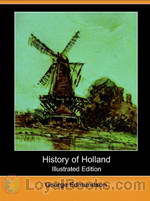 History of Holland
History of Holland
The title, “History of Holland,” given to this volume is fully justified by the predominant part which the great maritime province of Holland took in the War of Independence and throughout the whole of the subsequent history of the Dutch state and people. | |
By: George Edward Lewis | |
|---|---|
 Black Beaver The Trapper
Black Beaver The Trapper
| |
By: George Fillmore Swain (1857-1931) | |
|---|---|
 How to Study
How to Study
| |
By: George Greenwood (1799-1875) | |
|---|---|
 Hints on Horsemanship, to a Nephew and Niece or, Common Sense and Common Errors in Common Riding
Hints on Horsemanship, to a Nephew and Niece or, Common Sense and Common Errors in Common Riding
| |
By: George Hamilton | |
|---|---|
 Voyage Round the World in His Majesty's Frigate Pandora
Voyage Round the World in His Majesty's Frigate Pandora
George Hamilton was the surgeon assigned to the frigate Pandora. The British Admiralty ordered the ship to the Pacific to arrest the Bounty mutineers and bring them back to England for trial. The commander, Captain Edward Edwards, also was ordered to chart the passage between Australia and New Guinea. While Edwards managed to arrest the mutineers still on Tahiti, he sank the Pandora on a reef near Australia. Hamilton tells this story and also the story of the crew’s fate after the Pandora sank. | |
By: George Herbert Betts (1868-1934) | |
|---|---|
 New Ideals in Rural Schools
New Ideals in Rural Schools
| |
 The Recitation
The Recitation
| |
By: George Husmann (1827-1902) | |
|---|---|
 The Cultivation of The Native Grape, and Manufacture of American Wines
The Cultivation of The Native Grape, and Manufacture of American Wines
| |
By: George L. (George Leonard) Vose (1831-1910) | |
|---|---|
 Bridge Disasters in America The Cause and the Remedy
Bridge Disasters in America The Cause and the Remedy
| |
By: George L. Apperson (1857-1937) | |
|---|---|
 The Social History of Smoking
The Social History of Smoking
This work tells the history of smoking in England from the social point of view. Thus it does not deal with the history of tobacco growing or tobacco related manufacture, but is rather the story of how smoking has fitted in with the fashions and customs throughout the ages, and the changes in the attitude of society towards smoking. | |
By: George MacDonald | |
|---|---|
 Unspoken Sermons
Unspoken Sermons
George MacDonald was a Scottish author, poet, and Christian minister. In his day he was considered one of the great Victorian authors on par with Dickens, Thackeray, Kipling and the like. His reputation as an author, however, has not fared as well largely because of the ubiquitous and fervent presence of religion throughout his works.MacDonald's theology, though sprinkled liberally throughout his fairly substantial number of books, is perhaps nowhere more palpable than in Unspoken Sermons. These sermons, though by no means amongst the most popular of MacDonald's work, have had theological impact from their first appearance... | |
By: George Morang (1866-1937) | |
|---|---|
 The Copyright Question
The Copyright Question
This is a letter to the Toronto Board of Trade regarding Canadian copyrights. Morang requested an appearance before the Toronto Board of Trade but was denied. This is his letter in response. He wished to make clear his position. | |
By: George Müller (1805-1898) | |
|---|---|
 Answers to Prayer, from George Müller's Narratives
Answers to Prayer, from George Müller's Narratives
Mr. Brooks, in this compilation, has endeavored to select those incidents and practical remarks from Mr. Müller's Narratives, that show in an unmistakeable way, both to believers and unbelievers, the secret of believing prayer, the manifest hand of a living God, and His unfailing response, in His own time and way, to every petition which is according to His will. (From the Preface) | |
By: George Pearson | |
|---|---|
 The Escape of a Princess Pat
The Escape of a Princess Pat
Being the full account of the capture and fifteen months’ imprisonment of Corporal Edwards, of the Princess Patricia’s Canadian Light Infantry, and his final escape from Germany into Holland. | |
By: George S. (George Sewall) Boutwell (1818-1905) | |
|---|---|
 Thoughts on Educational Topics and Institutions
Thoughts on Educational Topics and Institutions
| |
By: George Sand (1804-1876) | |
|---|---|
 Marquis de Villemer
Marquis de Villemer
Caroline is a very intelligent woman. She received a good convent education until her father lost his fortune in a failed venture and died soon after. While her sister marries, Caroline has to go to Paris to support herself as a lady companion. In Paris, she is exposed to a privileged world she cannot dream to take part in. Or can she? Can her love for the good Marquis of Villemer win over social class and prejudice? - Summary by Stav Nisser. | |
By: George Santayana (1863-1952) | |
|---|---|
 Some Turns of Thought in Modern Philosophy
Some Turns of Thought in Modern Philosophy
Before the beginning of World War II, during the time of the Modernist movement in philosophy, George Santayana wrote these five descriptive essays. He examined John Locke’s sensationalism, British Idealism, the “Theory of Relativity”, Freud’s psychology, and Julien Benda’s preachment on the relations between God and the world. [Summary written by Gary Gilberd] | |
 The Life of Reason volume 1
The Life of Reason volume 1
The Life of Reason, subtitled "the Phases of Human Progress", is a book published in five volumes from 1905 to 1906, by Spanish-born American philosopher George Santayana (1863-1952). It consists of Reason in Common Sense, Reason in Society, Reason in Religion, Reason in Art, and Reason in Science. The work is considered to be the most complete expression of Santayana's moral philosophy [...]. Santayana's philosophy is strongly influenced by the materialism of Democritus and the refined ethics of Aristotle, with a special emphasis on the natural development of ideal ends... | |
 Winds of Doctrine: Studies in Contemporary Opinion
Winds of Doctrine: Studies in Contemporary Opinion
Even before the Great War turned the world upside down, Western civilization was being revolutionized at all levels: intellectually, philosophically, artistically. Noted positivist philosopher George Santayana published this volume on the eve of the War, trying to portray the status of philosophy and theology at that moment by analyzing six significant topics: 1. the intellectual "temper" of the age 2. the clash between Modernism and Christianity 3. the new idealism of Henri Bergson 4. the new skepticism of Bertrand Russell 5. Shelley's fusion of philosophy and poetry 6. the so-called "genteel" tradition in American philosophy. | |
By: George Sharswood (1810-1883) | |
|---|---|
 An Essay on Professional Ethics Second Edition
An Essay on Professional Ethics Second Edition
| |
By: George Sutherland (1855-1905) | |
|---|---|
 Twentieth Century Inventions: A Forecast
Twentieth Century Inventions: A Forecast
This work from 1901 predicts what technological developments will manifest in the twentieth century. The author, a technical journalist, presents ideas for inventions and new developments in the areas of power, transportation, agriculture, mining, domestic applications, electronic devices, warfare, music, art, and news. Many have come to pass. All of them provide an interesting look into how the next century was imagined and what challenges were anticipated for the progress of society. - | |
By: George Vivian Poore (1843-1904) | |
|---|---|
 London (Ancient And Modern) From The Sanitary And Medical Point Of View
London (Ancient And Modern) From The Sanitary And Medical Point Of View
This little book is an expansion of two addresses delivered in January, 1889. One deals with sanitary issues in London. The other deals with medical issues, mainly through the lives and careers of physicians. Though ancients are included, the main emphasis is upon the sixteenth through nineteenth centuries. - Summary by Book Preface and David Wales | |
By: George W. (George Whitfield) Pope (1867-) | |
|---|---|
 Determining the Age of Cattle by the Teeth
Determining the Age of Cattle by the Teeth
| |
By: George Washington Bain (1840-) | |
|---|---|
 Wit, Humor, Reason, Rhetoric, Prose, Poetry and Story Woven into Eight Popular Lectures
Wit, Humor, Reason, Rhetoric, Prose, Poetry and Story Woven into Eight Popular Lectures
| |
By: George Washington Cable (1844-1925) | |
|---|---|
 The Amateur Garden
The Amateur Garden
| |
By: George Washington Plunkitt (1842-1924) | |
|---|---|
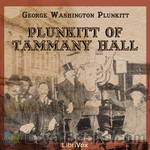 Plunkitt of Tammany Hall
Plunkitt of Tammany Hall
“I seen my opportunities and I took ‘em.”, George Washington Plunkitt of Tamminy Hall. There’s honest graft and dishonest graft according to Plunkitt. Listen to this candid discourse from a 19th century politician, and decide for yourself if things have changed. | |
By: George Washington Sears (1821-1890) | |
|---|---|
 Woodcraft
Woodcraft
| |
By: George Whale | |
|---|---|
 British Airships, Past, Present, and Future
British Airships, Past, Present, and Future
| |
By: George William Askinson | |
|---|---|
 Perfumes and their Preparation
Perfumes and their Preparation
Most of us take for granted the sense of smell. It gives pleasure, warning, anticipation and a sense of nostalgia. People have used perfumes since the days of Ancient Persia and Egypt in order to improve their personal smell. In this work, Askinson traces the history of perfumery and gives us an overview of the sources of perfumes and how they are manipulated to enhance our lives. - Summary by Lynne Thompson | |
By: George-Günther Freiherr von Forstner (1882-1940) | |
|---|---|
 The Journal of Submarine Commander Von Forstner
The Journal of Submarine Commander Von Forstner
The Journal of Submarine Commander Von Forstner is a graphic account of WWI submarine warfare. Forstner was the commander of German U-boat U-28. His journal, first published 1916, gives a gritty picture of daily life inside a submarine and details several torpedo attacks on Allied shipping. The 1917 translation of Forstner’s journal into English was unquestionably intended to bolster the Allied war effort. In the foreword, the translator states: “Nothing at the present day has aroused such fear as this invisible enemy, nor has anything outraged the civilized world like the tragedies caused by the German submarines... | |
By: Georgene Faulkner (1873-1958) | |
|---|---|
 White Elephant And Other Tales from Old India Retold
White Elephant And Other Tales from Old India Retold
This book is a collection of short stories from India. - Summary by sid | |
By: Gerard W. Bancks | |
|---|---|
 The Production of Vinegar from Honey
The Production of Vinegar from Honey
| |
By: Gertrude Burford Rawlings | |
|---|---|
 The Story of Books
The Story of Books
Rawlings follows the development of printing from the origins of writing to modern printing. Some of the earliest records are ancient Egyptian, Greek and Roman recordings on papyrus and wax tablets. However, Rawlings acknowledges the sparse nature of this first fragile evidence, and limits speculation.Later, libraries of religious books grew in Europe, where monks copied individual books in monasteries. The "block printing" technique began with illustrations carved in wood blocks, while the text needed to be written by hand... | |
By: Gertrude Jekyll (1843-1932) | |
|---|---|
 Wood and Garden
Wood and Garden
Wood and Garden reads like a walk through the garden with reknowned garden designer Gertrude Jekyll as she discusses her plant choices and placement, how she integrates nature into her design, and how she maintains and enjoys the garden. | |
By: Gesine Lemcke (1841-1904) | |
|---|---|
 Desserts and Salads
Desserts and Salads
| |
By: Giacomo Casanova (1725-1798) | |
|---|---|
 The Memoirs of Jacques Casanova
The Memoirs of Jacques Casanova
This is the first of five volumes. – Giacomo Casanova (1725 in Venice – 1798 in Dux, Bohemia, now Duchcov, Czech Republic) was a famous Venetian adventurer, writer, and womanizer. He used charm, guile, threats, intimidation, and aggression, when necessary, to conquer women, sometimes leaving behind children or debt. In his autobiography Histoire de ma vie (Story of My Life), regarded as one of the most authentic sources of the customs and norms of European social life during the 18th century, he mentions 122 women with whom he had sex... | |
By: Gilbert Sykes Blakely | |
|---|---|
 Teachers' Outlines for Studies in English Based on the Requirements for Admission to College
Teachers' Outlines for Studies in English Based on the Requirements for Admission to College
| |
By: Gilbert White (1720-1793) | |
|---|---|
 The Natural History of Selborne
The Natural History of Selborne
The Reverend Gilbert White was the curate of the village of Selborne, a village in Hampshire, from 1784 to his death in 1793, living most of his life in the village. The book is in the form of a collection of letters to two friends, discussing the natural history of the areas that he knew, and natural history in general. White’s intense curiosity and his love for the world about him flow through his simple, straightforward style, and a gentle sense of humour colours many of his anecdotes. | |
By: Giles Lytton Strachey (1880-1932) | |
|---|---|
 Eminent Victorians
Eminent Victorians
On Modern Library's list of 100 Best Non-Fiction books, "Eminent Victorians" marked an epoch in the art of biography; it also helped to crack the old myths of high Victorianism and to usher in a new spirit by which chauvinism, hypocrisy and the stiff upper lip were debunked. In it, Strachey cleverly exposes the self-seeking ambitions of Cardinal Manning and the manipulative, neurotic Florence Nightingale; and in his essays on Dr Arnold and General Gordon, his quarries are not only his subjects but also the public-school system and the whole structure of nineteenth-century liberal values. | |
By: Giorgio Vasari (1511-1574) | |
|---|---|
 Lives of the Most Eminent Painters, Sculptors and Architects
Lives of the Most Eminent Painters, Sculptors and Architects
The Lives of the Most Excellent Italian Painters, Sculptors, and Architects, from Cimabue to Our Times, or Le Vite delle più eccellenti pittori, scultori, ed architettori, as it was originally known in Italian, is a series of artist biographies written by 16th century Italian painter and architect Giorgio Vasari, which is considered "perhaps the most famous, and even today the most- read work of the older literature of art", "some of the Italian Renaissance's most influential writing on art", and "one of the founding texts in art history"... | |
By: Giovanni Verga (1840-1922) | |
|---|---|
 House by the Medlar Tree
House by the Medlar Tree
In a nineteenth century Sicilian fishing village, the Malavoglia family gambles everything on being able to profit from a cargo of lupin nuts. The cargo is lost at sea and a succession of misfortunes and tragedies assails the family. A masterpiece of social commentary hailed within Italy but neglected by the wider world, The House by the Medlar Tree ranks alongside the works of Zola, Dickens or Balzac among the great books of European literature. The book is the inspiration behind the 1948 film 'La Terra Trema' , one of the earliest works of the great Italian director Luchino Visconti. - Summary by Tom Denholm | |
By: Glenn D. Bradley (1884-1930) | |
|---|---|
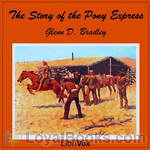 The Story of the Pony Express
The Story of the Pony Express
The Story of the Pony Express offers an in depth account behind the need for a mail route to connect the eastern U.S. with the rapidly populating west coast following the gold rush of California, the springing up of lumber camps, and all incidental needs arising from the settling of the western frontier. Here we learn of the inception of the Pony Express, its formation, successes, failures, facts, statistics, combined with many anecdotes and names of the people who were an integral part of this incredible entity which lasted but less than two years, yet was instrumental in the successful settlement of two thirds of the land mass comprising the expanding country... | |
By: Goldsworthy Lowes Dickinson (1862-1932) | |
|---|---|
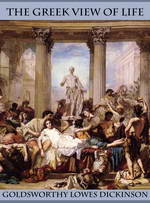 The Greek View of Life
The Greek View of Life
“With the Greek civilisation beauty perished from the world. Never again has it been possible for man to believe that harmony is in fact the truth of all existence.”This elegantly-written work provides a splendid introduction to the Greeks of the classic period: how they thought, wrote, and organised their lives and loves. Although it dates from the 1890s, there is very little about it that has dated. To its author’s credit, the subject of “Greek love” is dealt with in a sane and factual context - despite the judicial assassination of Oscar Wilde going on in the background... | |
By: Goldwin Smith (1823-1910) | |
|---|---|
 Lectures and Essays
Lectures and Essays
| |
By: Gordon Lamont | |
|---|---|
 Opportunities in Aviation
Opportunities in Aviation
| |
By: Grace R. Clifton | |
|---|---|
 Ohio Arbor Day 1913: Arbor and Bird Day Manual Issued for the Benefit of the Schools of our State
Ohio Arbor Day 1913: Arbor and Bird Day Manual Issued for the Benefit of the Schools of our State
| |
By: Grace Rogers Cooper | |
|---|---|
 The Scholfield Wool-Carding Machines
The Scholfield Wool-Carding Machines
| |
By: Grace Viall Gray | |
|---|---|
 Every Step in Canning
Every Step in Canning
| |
By: Grenville Kleiser (1868-1953) | |
|---|---|
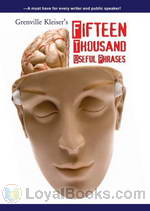 Fifteen Thousand Useful Phrases
Fifteen Thousand Useful Phrases
Fifteen Thousand Useful Phrases is a practical handbook written by Grenville Kleiser. Grenville is known for his writings on humor, positive thinking and inspirational thought. This serves as a handbook of pertinent expressions, striking similes and terms for embellishing speech and literature. This book can be used to improve vocabulary for reading, writing and speaking alike. Through mastery of words, the most powerful and perfect expression of thought can be delivered orally. Choosing the correct words conveys ideas in a crisp and clear way that will hold and audience's attention... | |
By: Gustav Kobbé (1857-1918) | |
|---|---|
 How to Appreciate Music
How to Appreciate Music
Originally published in 1906, this book is essentially a how to guide on music appreciation. Includes sections on the pianoforte, orchestral, and vocal music. Good for anyone who wishes for a greater appreciation of the wonders of music. | |
By: Gustave Flaubert (1821-1880) | |
|---|---|
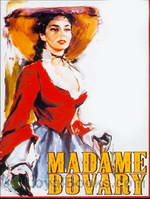 Madame Bovary
Madame Bovary
The strands woven together in Gustave Flaubert's famous, path breaking 1856 novel Madame Bovary include a provincial town in Normandy, France, a shy young doctor with an indifferent career and a lovely young woman who lives in a fantasy world based on the innumerable romantic novels she reads. Of course there is also the story of a dull marriage punctuated by passionate, adulterous love affairs. First published in serial form in a Parisian magazine and deemed to be the “perfect” novel, Flaubert's debut was received by both readers and critics with acclaim and admiration... | |
By: Gustave Le Bon (1841-1931) | |
|---|---|
 Crowd
Crowd
"Civilisations as yet have only been created and directed by a small intellectual aristocracy, never by crowds. Crowds are only powerful for destruction. Their rule is always tantamount to a barbarian phase. A civilisation involves fixed rules, discipline, a passing from the instinctive to the rational state, forethought for the future, an elevated degree of culture — all of them conditions that crowds, left to themselves, have invariably shown themselves incapable of realising. In consequence of the purely destructive nature of their power crowds act like those microbes which hasten the dissolution of enfeebled or dead bodies... | |
By: H. D. Higinbotham | |
|---|---|
 Official Views Of The World's Columbian Exposition
Official Views Of The World's Columbian Exposition
| |
By: H. G. Wells (1866-1946) | |
|---|---|
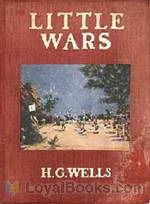 Little Wars (A Game for Boys)
Little Wars (A Game for Boys)
Miniature wargaming got its start with the publication in 1913 of this thoroughly entertaining little account of how H.G. Wells, with certain of his friends, took their childhood toys and turned play into acceptable middle-aged sport by subjecting the exercise to the civilizing influence of actual rules. While wargaming progressed far past these beginnings, Wells observes how “little wars” with even his elementary rules can suggest the wholesale crudity of the real thing. “You have only to play at Little Wars three or four times to realise just what a blundering thing Great War must be... | |
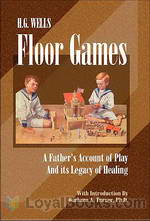 Floor Games
Floor Games
H.G. Wells had so much fun playing with his children on the floor of their playroom, he decided to write a jovial little book to inspire other parents in their pursuit of quality time with the kids. While the raw materials available from hobby stores of his day were woefully short of the variety and quality of what can be bought easily now, he and his sons created their own worlds to rule. This short work describes two games of imagination played out upon the floor of his home – an archipelago of islands, and a thoroughly integrated city, conveniently organized with two mayoral positions for his sons “G... | |
 God, the Invisible King
God, the Invisible King
Wells wrote in his book God the Invisible King that his idea of God did not draw upon the traditional religions of the world: "This book sets out as forcibly and exactly as possible the religious belief of the writer. [Which] is a profound belief in a personal and intimate God." Later in the work he aligns himself with a "renascent or modern religion ... neither atheist nor Buddhist nor Mohammedan nor Christian ... [that] he has found growing up in himself." | |
 Anticipations
Anticipations
Wells considered this book one of his most important, a natural follow-up to such works as his Man of the Year Million and The Time Machine. His goal was to get people to think and act in new ways. The book starts with a look at how humans get along socially and how they carry out their business ventures. It then discusses how these elements influence others, such as politics, the world of work, and education. H. G. tried to make clear how the current social order was disintegrating without preparing another to take its place. He then traced the roots of democracy, which in its present state he saw as unworkable. Instead, he proposed a new republic. He also critiqued modern warfare. | |
 War That Will End War
War That Will End War
.About the First World War, and the author's conclusions. Whether or not you agree with these articles/essays, H G Wells does make many valid points about the war, and it's effect on people, especially in Britain. I suppose he cannot be blamed for getting the concept and the title wrong, in hindsight, as there were barely 22 years to pass before the Second World War with Germany began. Wells highlights the corruption both in Britain and Germany during the terrible conflict, and the humanitarian price which had to be paid... | |
By: H. Harold (Hardrada Harold) Hume (1875-1965) | |
|---|---|
 The Pecan and its Culture
The Pecan and its Culture
| |
By: H. Ling (Henry Ling) Roth (1855-1925) | |
|---|---|
 Ancient Egyptian and Greek Looms
Ancient Egyptian and Greek Looms
| |
By: H. R. Hill | |
|---|---|
 A Succinct View of the Importance and Practicability of Forming a Ship Canal across the Isthmus of Panama
A Succinct View of the Importance and Practicability of Forming a Ship Canal across the Isthmus of Panama
| |
By: H. R. Playtner | |
|---|---|
 An Analysis of the Lever Escapement
An Analysis of the Lever Escapement
| |
By: H. S. Adams (1864-?) | |
|---|---|
 Making a Rock Garden
Making a Rock Garden
A short look at building a rock garden, right from the rocks themselves and how to arrange them, to choosing and placing the plants, touching wall and bog gardens, too. In this little monograph, the author is trying to draw the eyes of U.S. gardeners in to the intimate beauty of this neglected hobby.The original work has a number of attractive and useful photographs and drawings. | |
By: Hannah Trager (1870-1943) | |
|---|---|
 Pictures of Jewish Home-Life Fifty Years Ago
Pictures of Jewish Home-Life Fifty Years Ago
Hannah Trager published Pictures of Jewish Home-Life Fifty Years Ago in 1926, so the book is a portrait of day to day life for a Jewish family in Jerusalem around 1876. In each chapter, Mr. Jacobs reads a letter from his cousins living in Jerusalem many years earlier, each one teaching his family and friends about a different holiday or tradition of their people. (Introduction by wildemoose) | |
By: Harold Bindloss (1866-1945) | |
|---|---|
 Sunshine and Snow
Sunshine and Snow
A harrowing and dramatic story of four siblings from Scotland who are poor, and orphaned. The eldest brother, Arthur, is guardian to his two brother's and one sister.) After the bank in Scotland fails, Arthur decides as family head, they will go to Canada to answer an ad to claim free farm land. Arthur is a former soldier, smart, honest, and a tremendously hard worker; his younger brothers are still in school, and Charley, Leaving their sister behind temporarily, they board a steamer for Canada, but they have no idea of the hardships and life threatening battles that await in the untamed land... | |
By: Harold Edward Gorst (1868-1950) | |
|---|---|
 The Curse of Education
The Curse of Education
| |
By: Harold P. (Harold Phillips) Manly (1887-) | |
|---|---|
 Oxy-Acetylene Welding and Cutting Electric, Forge and Thermit Welding together with related methods and materials used in metal working and the oxygen process for removal of carbon
Oxy-Acetylene Welding and Cutting Electric, Forge and Thermit Welding together with related methods and materials used in metal working and the oxygen process for removal of carbon
| |
By: Harold W. Fairbanks (1860-1952) | |
|---|---|
 The Western United States: A Geographical Reader
The Western United States: A Geographical Reader
“In preparation of this book the author has had in mind the needs of the upper grammar grades. The subject matter has not been selected with the object of covering the field of Western geography in a systematic manner, but instead the attempt has been made to picture as graphically as may be some of its more striking and interesting physical features, and the influence which these features have exerted upon its discovery and settlement.” (from the Preface of The Western United States) | |
By: Harriet Beecher Stowe (1811-1896) | |
|---|---|
 American Woman's Home
American Woman's Home
| |
 Palmetto Leaves
Palmetto Leaves
After the Civil War, Harriet and her husband Charles bought an Orange Plantation in Mandarin, on the upper east coast of Florida, where they lived during the winter months. Over the years they expanded their cottage to accommodate many guests . They opened schools to educate and churches to care for the recently freed negros pouring into Florida seeking refuge and opportunity. These charming essays, each describing a largely undeveloped rural land, became one of the first travel guides written about Florida and stimulated the first boom of tourism and residential development to that area... | |
By: Harriet Jacobs (1813-1897) | |
|---|---|
 Incidents in the Life of a Slave Girl, Written by Herself
Incidents in the Life of a Slave Girl, Written by Herself
Born in slavery, but being fortunate enough to be owned by a benevolent mistress, her life takes a tragic turn when her parents and her benefactor die. The new heir to the property (and slaves) is a cruel and lewd man who begins to make inappropriate advances to the lovely young slave-girl. In a bid to escape, she becomes entangled in a relationship with a neighboring landowner who promises a better life, and she even has two children. However, things become worse for her when her cruel owner decides to punish her by sending her and her children to a distant cotton plantation to be “broken in... | |
By: Harrison Weir (1824-1906) | |
|---|---|
 Our Cats and All About Them
Our Cats and All About Them
The Englishman Harrison Weir organized the first cat show in England in 1871. In 1887 he founded the National Cat Club and was its first President and Show Manager until his resignation in 1890.Our Cats and all about them is concerned with cats and all about them. It describes numerous breeds of cats and what to look for in a cat show champion, and deals with the general management and common diseases of cats, as well as how to raise healthy kittens. But there is also a hodge podge of cat related stories, games, nursery rhymes, superstitions, as well as a list of cat lovers and a chapter of "The Cat in Shakespeare". | |
By: Harry Houdini | |
|---|---|
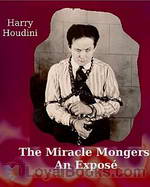 The Miracle Mongers, an Exposé,
The Miracle Mongers, an Exposé,
“A complete exposé of the modus operandi of fire eaters, heat resisters, poison eaters, venomous reptile defiers, sword swallowers, human ostriches, strong men, etc.”, [by Harry Houdini, from the subtitle]. | |
By: Harry Lushington Stephen (1860-1945) | |
|---|---|
 State Trials, Political and Social Volume 1 (of 2)
State Trials, Political and Social Volume 1 (of 2)
| |
By: Harry Snyder (1867-1927) | |
|---|---|
 Human Foods and Their Nutritive Value
Human Foods and Their Nutritive Value
| |
By: Hattie E. Macomber | |
|---|---|
 Stories of Great Inventors Fulton, Whitney, Morse, Cooper, Edison
Stories of Great Inventors Fulton, Whitney, Morse, Cooper, Edison
| |
By: Havelock Ellis (1859-1939) | |
|---|---|
 Studies in the Psychology of Sex, Volume One
Studies in the Psychology of Sex, Volume One
The first of six volumes, this volume covers in extensive detail the topics of "The Evolution of Modesty", "The Phenomena of Sexual Periodicity", and "Auto-Eroticism". Written as an anthropological and psychological study from the point of view of Havelock, the famous British sexologist of the late 19th century, who was also a physician and social reformer. | |
By: Hawaii | |
|---|---|
 Patent Laws of the Republic of Hawaii and Rules of Practice in the Patent Office
Patent Laws of the Republic of Hawaii and Rules of Practice in the Patent Office
| |
By: Helen Campbell (1839-1918) | |
|---|---|
 The Easiest Way in Housekeeping and Cooking Adapted to Domestic Use or Study in Classes
The Easiest Way in Housekeeping and Cooking Adapted to Domestic Use or Study in Classes
| |
By: Helen Clarke (1860-1926) | |
|---|---|
 Guide to Mythology
Guide to Mythology
My aim in this book on Mythology for young readers has been to give them solid knowledge on the subject, as far as it is advisable to go with immature minds, based upon the most recent investigations of scholars, and to select the myths used in illustration of the plan, with a view to giving them interesting stories to read, which will, almost unconsciously to themselves, lay a firm foundation for the fascinating study of Comparative Mythology, should they wish to go more deeply into it in the future... | |
By: Helen Ekin Starrett (1840-1920) | |
|---|---|
 Letters to a Daughter and A Little Sermon to School Girls
Letters to a Daughter and A Little Sermon to School Girls
Helen Ekin Starrett, journalist, mother of two daughters, grandmother of seven granddaughters and teacher to many young girls at the Starrett School for Girls offers lessons in life and religion to girls about to "pass out from the guardianship of home into life with its duties and trials". | |